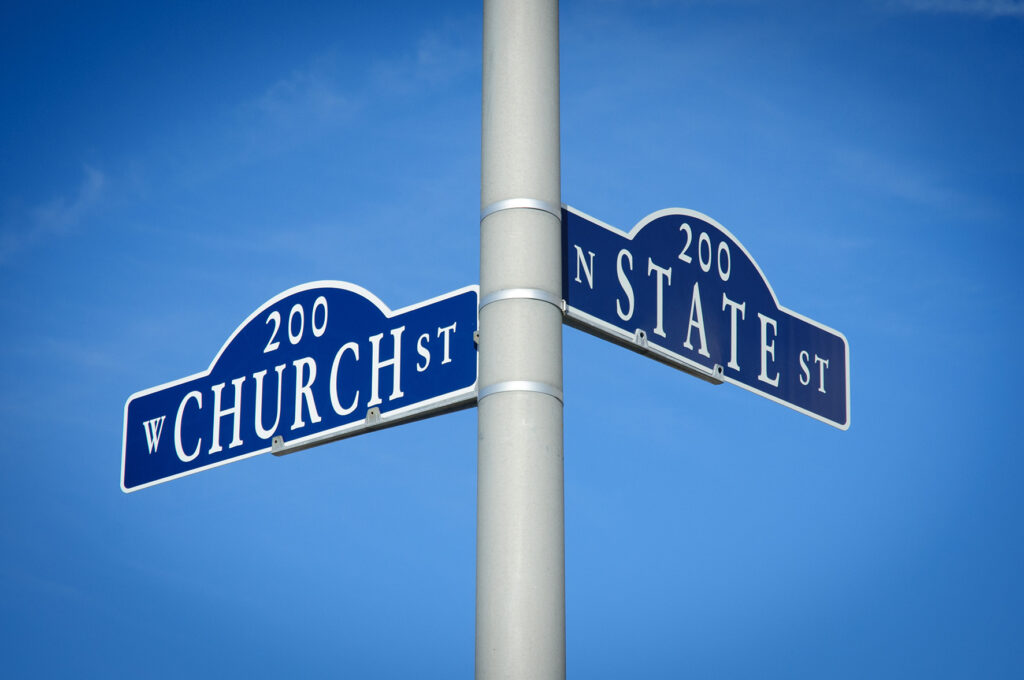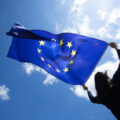To decline is not to disappear: Europe’s disregard for religion creates unnecessary conflict
To decline is not to disappear:
Europe’s disregard for religion creates unnecessary conflict
Europe is often described as a secular continent, with many labelling it “postchristian.” Yet religiosity is far from extinguished in Europe, according to Tyler Mikulis from our analyst team. In fact, these labels have unnecessarily generated new and exacerbated existing political problems as European governments trend towards neglecting their religious constituents, he argues.
This article was written by Tyler Mikulis and reflects his personal analyses and opinions, rather than those of EARS.
In discourse on religion and Europe nowadays, the term ‘postchristian’ has become commonplace, as studies continue to show a decline in Christian religiosity, especially amongst younger generations.[1] In fact, after analysing religiosity data compiled from the European social survey of 2014-2016, Professor Stephen Bullivant of St. Mary’s University in London claimed that, for Europe, “Christianity as a default, as a norm, is gone and probably gone for good.”[2] Bullivant’s claim, though seemingly dramatic, aligns with how many Europeans see themselves: as nations existing in a secular age, especially when it comes to political matters.[3] [4] [5] Despite evidence of decreasing religiosity, however, viewing Europe as a secular, postchristian entity is a mistake, one I believe to be exacerbating several of Europe’s current political struggles.
Truly a postchristian continent?
Before examining the political struggles, I want to first problematise Europe’s postchristian status. To do so, let us start by considering the data. In his analysis, Bullivant focused predominantly on data representative of a younger generation (16-29-year-olds).[6] While the cited numbers indicate decreasing religiosity in a significant subsection of the population, they also reveal that a large number of younger Europeans still identify as religious. In fact, in several countries, like Germany and Poland, the largest subsection of respondents professed a Christian identity.[7]
The overall number of individuals reporting a Christian affiliation becomes larger when surveys are widened to consider the entire population. According to data gathered by Pew-Templeton, in 2020, about 72.2% of Europeans have a Christian affiliation. When combined with the 6.8% who have a Muslim affiliation, that means nearly 80% of Europeans have a religious affiliation.[8] To be fair, such a high percentage does not signify that all those Europeans consider religion an important part of their life. For instance, other studies have shown that only around 18% of Europeans attend church monthly or more.[9] While the exact number of those who consider religion important is likely higher, as monthly church attendance is not a requirement of valuing religion, 18%, and as much as 40% in some countries,[10] still represents a non-negligible amount of the population. Furthermore, being ‘religiously unaffiliated’ does not mean that an individual is an atheist. In fact, research conducted on religiously unaffiliated French citizens in 2008 found that about 30% of them still believe in God or a higher power.[11] Recent studies across Europe have corroborated this, finding about 29% either believe in God as described in the Bible or in another spiritual force or higher power.[12] [13]
Religious belief is not gone yet. However, most European politicians often steer clear of religious issues beyond protecting religious minorities.[14] This lack of attention can make, and I believe has made, addressing religious issues more difficult. Furthermore, the lessened attention has led to government missteps that may have been foreseeable had the religious response been better considered.
Scottish hate speech bill
Take, for instance, the Scottish government’s recent attempts to pass the Hate Crime and Public Order Bill. Motivations for the bill,[15] first proposed in April 2020, are respectable: merge existing disconnected hate crime legislation into one central law, strengthen some provisions, and eliminate others.[16] However, the writers of the bill overstepped their aims by including a section that would have criminalised the publication of “inflammatory” material, regardless of authorial intent. Several diverse organisations swiftly sounded the alarm, decrying the implications the bill would have on free speech. Among some of the loudest critics of the bill were journalists, humanist groups, and religious organisations – particularly Christian and Sikh groups.[17] Several prominent Christian Scottish organisations warned that the law could be construed to criminalise sections of the Bible and other religious writing.[18]
Not all religious groups disapproved of the bill’s controversial sections. Muslim Engagement and Development (MED) and the Scottish Council of Jewish Communities (Scotjec) have argued in its favor. However, even Scotjec recommended reforming the bill, arguing that Jewish and Sikh groups are already protected as ethnic minorities and that their protections should apply to other religious groups as well.[19] Had the Scottish government thought a bit more about all religious groups, or welcomed their input in working on the legislation, they may have been able to avoid the headaches caused by the backlash. Not only would it have made their jobs easier, it would also have helped important legislation get passed faster with a broader coalition of support.
COVID-19 restrictions
Hate crime is not the only area where religious input has been ignored, thereby exacerbating government interests. When COVID-19 first spiked across Europe in early spring 2020, European countries scrambled to slow the spread, imposing a series of restrictions and closures, aimed at decreasing social interactions. As places that encourage socialisation, singing, and communal eating and drinking, churches, mosques, and synagogues swiftly became targets of restrictions, some being forced to close altogether.[20]
European governments had legitimate aims when issuing these restrictions and, in many cases, places of worship agreed, even self imposing some measures. However, the manner by which European governments imposed bans on worship alarmed many. They were often blunt and lacked nuance, leading to a sense of frustration amongst religious groups, who felt the bans had been imposed without true concern over the collateral religious consequences.[21] [22] The German government, for instance, passed a blanket ban on religious worship in mid-March. When the government began allowing certain reopenings among small shops, religious groups complained that they had illegally been left out and that places of worship that followed strict health regulations should be allowed to be exceptions to the blanket ban. The German constitutional court agreed and struck down the blanket ban, allowing for exceptions.[23]
In May, a similar situation occurred in France, when the Council of State struck down France’s blanket closure of places of worship. Additional complaints have risen in countries like Luxembourg and the United Kingdom – especially in light of the latter’s second lockdown. Religious leaders, like Archbishop of Luxembourg Jean-Claude Hollerich and Archbishop of Canterbury Justin Welby, have expressed disappointment with their respective governments for not working more closely with religious institutions during the crisis.[24] [25] [26]
In periods of national health crises, like the coronavirus pandemic, the more unified citizens can be in their responses, the better the chances of slowing the spread. European governments have bruised key relationships unnecessarily by disregarding the input of religious institutions, thereby alienating those for whom religion is an important part of life.[27] [28]
Euroscepticism from Catholics
Additionally, the European Union risks souring the opinions of some of its traditional supporters by consistently failing to address issues they consider important. There has long been a belief that Catholics are more likely to support the EU than Protestants as they are more open to a united Europe, like a united Christendom. While the data supporting this are far from perfect,[29] the EU’s popularity amongst Catholic groups has been faltering in recent years. From the predominantly Catholic and anti-EU gilets jaunes in France to the difficulties the EU is having with Poland’s ruling Law and Justice party, the EU would do well to focus on altering its perception and spending more time understanding the religious concerns of its inhabitants. That is not to say that the EU or any European government should endorse a particular religion or be beholden to any religious views – they should not – but they disregard religious issues in politics at their own peril.
This article was written by Tyler Mikulis and reflects his personal analyses and opinions, rather than those of EARS.
Interested in similar topics? Go to our Dashboard and receive free updates.
[1] ‘Christianity as default is gone’: the rise of a non-Christian Europe
[2] ‘Christianity as default is gone’: the rise of a non-Christian Europe
[3] Taylor, C., 2007. A Secular Age. Cambridge: Harvard University Press.
[4] What is the fate of religion in Europe?
[5] Church attendance – Confidence in the church – Importance of God – Traditional beliefs
[6] ‘Christianity as default is gone’: the rise of a non-Christian Europe
[7] ‘Christianity as default is gone’: the rise of a non-Christian Europe
[8] Pew Center: Europe – Religious Affiliation 2020
[9] Europe: Not as secular as you think
[10] Europe: Not as secular as you think
[11] The Global Religious Landscape
[12] Europe: Not as secular as you think
[13] Being Christian in Western Europe
[14] EU steps up fight against antisemitism
[15] Hate Crime and Public Order (Scotland) Bill
[16] Why is Scotland’s Hate Crime Bill so controversial?
[17] Bibles and newspapers ‘would be banned under new hate crime law’
[18] Bibles and newspapers ‘would be banned under new hate crime law’
[19] Bibles and newspapers ‘would be banned under new hate crime law’
[20] La France sera parmi les derniers pays européens à restaurer la célébration publique des cultes
[21] Church criticism: Archbishop of Luxembourg denounces government over Mass restrictions
[22] La France sera parmi les derniers pays européens à restaurer la célébration publique des cultes
[23] Germany’s top court rules against coronavirus ban on religious services
[24] Church criticism: Archbishop of Luxembourg denounces government over Mass restrictions
[25] Faith leaders challenge England lockdown ban on communal worship
[26] Freedom of religion vs. public health
[27] For more: Freedom of religion vs. public health
[28] For more: New tech, politics, and old religion: What is the future of technology in religion?
[29] For more: Does religious belief affect views of the EU?






